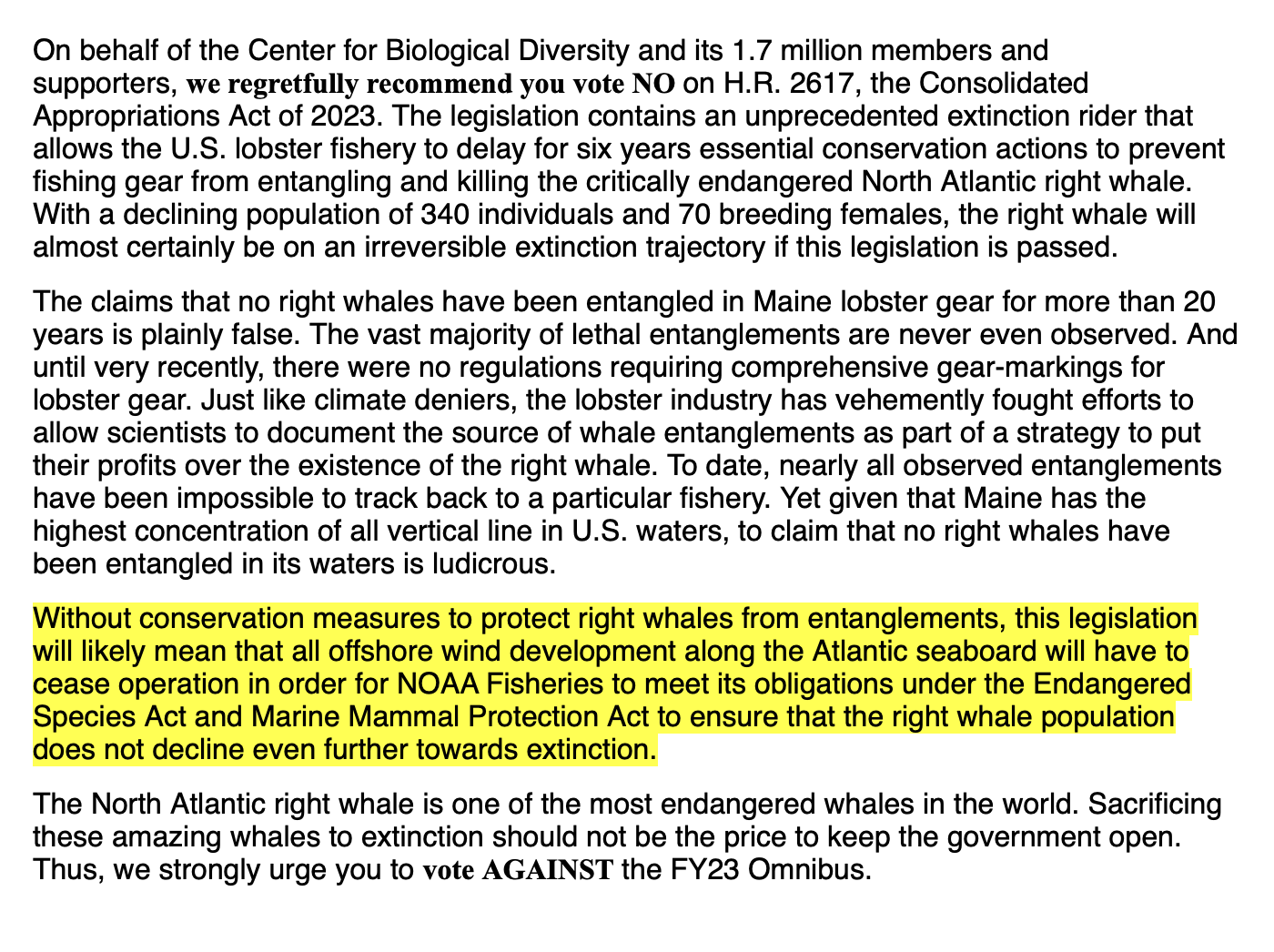As whales were washing up dead on the northeastern coast of the U.S., a conservation group quietly sounded the alarm to Senate Democrats t...
As whales were washing up dead on the northeastern coast of the U.S., a conservation group quietly sounded the alarm to Senate Democrats that the development of offshore wind farms might need to “cease” to protect an endangered species of whales from “extinction,” according to a letter exclusively obtained by the Daily Caller News Foundation.
On Dec. 20 the Center for Biological Diversity (CBD) — an endangered species advocacy group — sent a letter to 50 Democratic senators, warning them that offshore wind development might put North Atlantic right whales in danger. The letter was sent after a last-minute provision was added to the fiscal year 2023 omnibus spending bill, which would allow lobster fisheries to avoid stricter environmental regulations.
The bill ultimately passed, with the CBD decrying Democrats’ decision to agree to an “unprecedented extinction rider” that would allow fishers to put whales in danger, in a Dec. 22 press statement. This public statement made no mention of the possible threat of offshore wind farms.
After six humpback and sperm whales washed up deceased in New York and New Jersey in 33 days, with the first washing up on Dec. 5, Clean Ocean Action (COA) — a New Jersey waterways activism group — called for an immediate federal investigation into the deaths and a moratorium on all offshore wind farm development, in a Jan. 9 press release, citing the “suspicions” raised by the deaths coinciding with development projects for offshore wind farms.
The statement drew criticism from the New Jersey chapter of the Sierra Club, who quoted advocates from nonprofit environmental group New Jersey Audubon, and nonprofit marine advocacy groups like Clean Water Action and Surfrider Foundation to push back on the claim, calling it “unfounded and premature,” in a Jan. 13 press release.
There are currently six offshore wind projects slated for development in New Jersey, spanning hundreds of square miles, with five under active development in New York, according to the respective state governments.
The Dec. 20 CBD letter argued that if the omnibus spending bill passed without placing harsher restrictions on lobster fisheries — whose fishing lines have been found to endanger whales — the National Oceanic and Atmospheric Administration (NOAA) would likely need to pull the plug on offshore wind farms in a bid to stave off extinction for endangered right whales.
“Without conservation measures to protect right whales from entanglements, this legislation will likely mean that all offshore wind development along the Atlantic seaboard will have to cease operation in order for NOAA Fisheries to meet its obligations under the Endangered Species Act an Marine Mammal Protection Act to ensure that the right whale population does not decline even further towards extinction,” the CBD wrote.

CBD letter to Democratic Senators urging a no vote on the fiscal year 2023 omnibus spending bill, in part due to the possibility that North Atlantic right whales might be injured by offshore wind farm development. Screenshot/DCNF
The controversy surrounding COA’s claims prompted the National Oceanic and Atmospheric Administration (NOAA) to host a Jan. 18 press conference — by which point two additional whales had died — where officials said that humpback whales had been dying at elevated rates in the region since January 2016, according to the AP. NOAA officials argued that in studying the 178 whales that had washed ashore since 2016, none showed signs of being impacted by offshore wind development.
However, top NOAA scientist Sean Hayes, chief of the protected species branch at the National Northeast Fisheries Science Center (NEFSC), warned the agency last year that both wind farms and their development could have drastic consequences on New England whale populations, particularly the Right whale, according to Bloomberg, who uncovered his May 13, 2022 warning via a Freedom of Information Act request.
“Additional noise, vessel traffic and habitat modifications due to offshore wind development will likely cause added stress that could result in additional population consequences to a species that is already experiencing rapid decline,” Hayes said, according to Bloomberg.